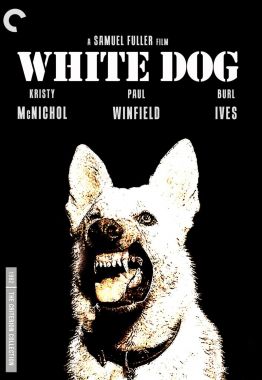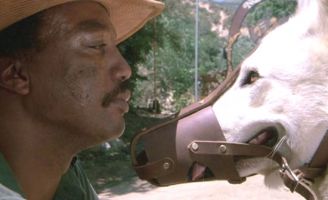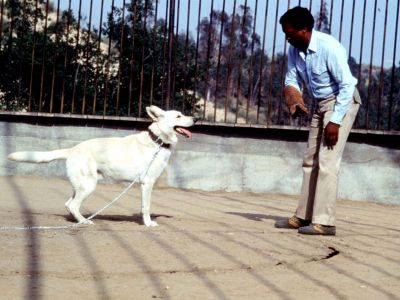White Dog (1982)
Directed by Samuel Fuller "White Dog" is a American drama film based on a 1970 novel by Romain Gary with the same name, about a dog who trained by white bigots to attack any of black man. This movie released on November 12, 1982 (United States) and starring
- Kristy McNichol as Julie Sawyer
- Paul Winfield as Keys
- Burl Ives as Carruthers
- Jameson Parker as Roland Grale
Contents
Plot
The plot follows an up-and-coming young actress, Julie (played by Kristy McNichol), who hits a stray dog, a beautiful white German shepherd, one night driving to her home in the Hollywood hills. She develops a bond with him as she nurses the animal back to health and posts signs across town for the owners. He's gentle enough to encourage her to pry open his jaws in order to push a pill down. And the dog also defends her from an intruder's attempted rape. Later, the dog goes missing after chasing a rabbit into the woods. Julie's searching for a pound leads to a desperate scene where she sees a dog cruelly killed.
Afterwards, she decides to keep the stray for herself. In the meantime, the dog attacks and kills a Black man driving a street sweeper, and later that night, when he returns to Julie, she is overjoyed and assumes that the bloodstains on his white fur are from the rabbit he hunted earlier. Her boyfriend, Roland (played by Jameson Parker), is not convinced of the dog's innocence and is more than once threatened by the dog's protective behavior towards Julie. Not until the dog attacks one of Julie's cast members, a young woman of color, does she recognize the problem. She refuses, however, to have the dog put down, as Roland suggests, and declares her intention to have the animal "refrained" by a professional.
Julie takes the dog to Carruthers (played by Burl Ives), who runs an operation that rents lions, tigers, chimps and bears to Hollywood films (complete with too-small cages and questionable living conditions). Carruthers sees the problem right away—"It's not an attack dog you've got. This is a white dog!" And he refuses to help. However, Julie then met Keys (played by Paul Winfield) who is black and he is Carruthers' business partner, who had long hoped to reeducate a white dog. She agrees to leave the dog with Keys, who proceeds to lock himself in an arena-like cage and to allow the dog to attack his protective padding until the animal tires and can no longer attack. "I will teach you that it is useless to attack black skin," he explains. For Keys, it's a matter of hope, a symbol that racist viewpoints can be changed not only in this animal, but in the world in general. Even after the dog escapes and kills another Black man, this time in a church, and even after Julie gives up hope, Keys is determined to change the animal for the better. He must believe that he can change racism; it has become an obsession, though an ill-fated one.
Pro
In the movie, Keys determined to change the dog to be better and he believed that racism can be change and it shows that racism should be seen as a problem for its subject and not for those who have been subjected to it.[1]
"Just one of the many remarkable things about Fuller's impeccable treatment of racism is that it investigates that vile trait without showing a racist character. The dog is a perfect symbol for the confused and vicious conditioning that runs riot throughout the human world".[2]
Armond White on Criterion.com says "He (Fuller) wasn’t exploiting racism but defining its least suspected characteristics (highlighting such seemingly harmless activities as pet care and the casual passing on of attitudes to children) and imagining what happens when conscientious people seek to end it."[3]
Controversy
The movie shows about the "white dog" who trained by former white bigotry to attack every black people in its sight and it makes Paramount decided to pull the film and it was a complaints reaction from the NAACP, which worried that the film would give “the KKK and other white supremacist organizations ideas.” Fuller also depict his outrage over bigoted ideologies remains the most aggressive strain in White Dog.[4]
Paramount also had softly dropped the film after the Beverly Hills–Hollywood branch of the NAACP objected to its provocative subject matter and content. NAACP spokesperson Collett Wood protested “We’re against the whole thrust of the film and what it says about racism, especially with the rise of the Klan, which always occurs during bad economic times.”[5]
Reference
- ↑ https://lwlies.com/articles/white-dog-samuel-fuller-anti-racist-allegory/
- ↑ https://www.timeout.com/movies/white-dog
- ↑ https://www.criterion.com/current/posts/848-white-dog-fuller-vs-racism
- ↑ https://deepfocusreview.com/reviews/white-dog/
- ↑ https://www.criterion.com/current/posts/848-white-dog-fuller-vs-racism


